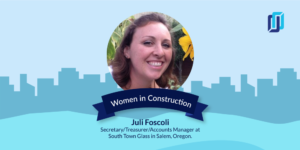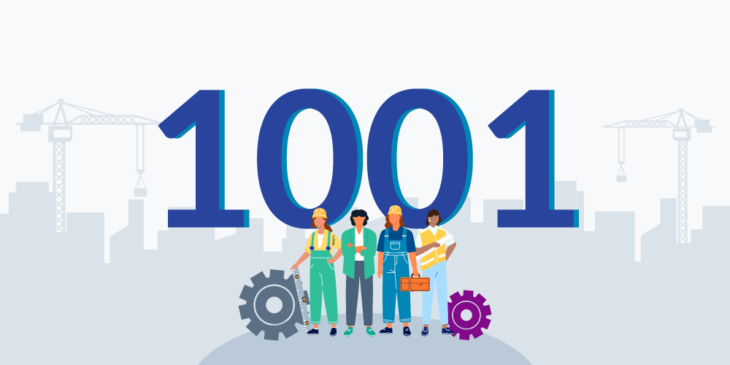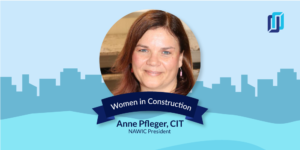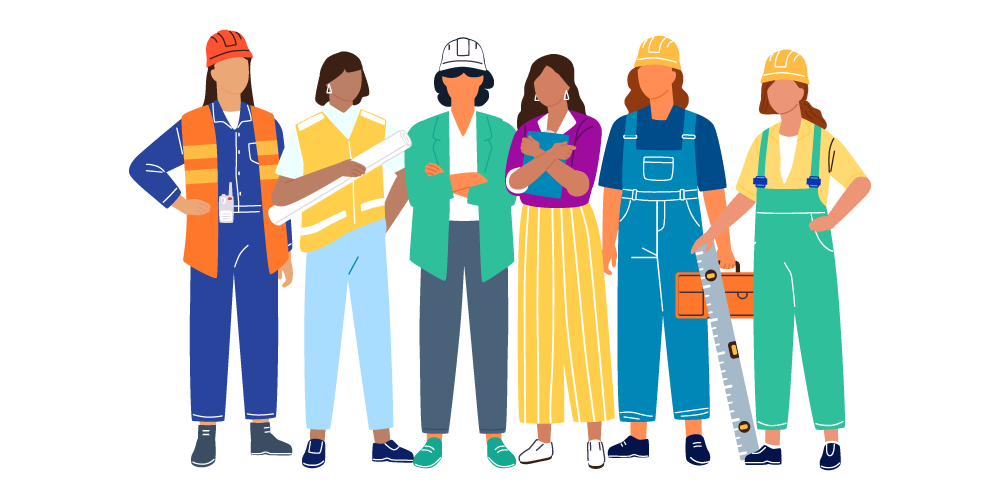
Juli Foscoli is the Accounts Manager at South Town Glass in Salem, Oregon. She also serves as the company’s secretary and treasurer.
After growing up around the construction industry, Juli initially pursued a different career path — but was soon drawn back to the construction community, where she has found incredible professional and personal support from other women in the industry. I spoke with Juli about her professional journey, and the importance of “finding your tribe” of other women you can rely on.

See what 1,001 women in construction said about their jobs, their coworkers, and the state of the industry.
Dawn: How long have you been working in the construction industry?
Julie: My entire life. As a kid, I grew up here at the shop, running around, building things out of cardboard boxes and screen material. We had these big units and there are these tiny silicon balls that come out of them then they break. And my sister and I used to go running and slide across the glass shop on those.
When I started out, they gave me a putty knife and I would scrape caulking off the floor around the glass table while they were cutting glass. I was always doing odd jobs, like sweeping the floors.
What does your day-to-day work life look like?
There’s a monthly cycle of things I do. We have our contractor bill outs every month and that’s always stressful. I get the packets ready and out to our project managers. They tell me what they’re going to be billing. I double-check the costs, then I get the invoices and the SOVs put together.
I also handle all the insurance, getting paperwork like lien waivers and releases, and everything that the contractors need. I also do collections, pay the bills, and a lot of other stuff. I run the weekly safety meetings and I do stretch and flex with the guys every morning. With all my volunteer work and boards, I’m so busy, I can’t even see straight.
Tell me about your career journey: Where did you start? How did you get to the position you’re in today?
At the end of high school, I’d work here a little bit in the summer. I worked in the front office and helped out there because it gets so busy in the summer. I went to school for nursing, finished my pre-nursing education, got accepted into the program, and was going to be a nurse.
Then I found out I was pregnant. I started working at the shop because I couldn’t go through the program. Then three months after I had Taylor, I was pregnant with Grace. I became a mom and I worked at the shop. I brought the babies to work, and Mom and I would take care of them.
I learned a bit more of the accounting side of the business, but not a lot. I would mostly just help out wherever I could, entering bills and things like that. Then my husband at that time and I bought a glass shop over in Enterprise, Oregon. We moved there and I ran the office and the books. He and our one employee were out installing and working all day. I was in the office — now with three kids. I’d be reading them books, and then customers would come in and it just got really difficult. So we hired a secretary.
Then we moved back here, and I was a single mom who was going through a divorce. I stayed at home because the cost of daycare was way more than I would have made. I’d have to work three jobs. Thankfully, my mom and dad had a rental house and they let me live there for free.
In 2012, I had done all my steps to pre-nursing and was ready to go back to nursing. But I didn’t get in, it was a lottery, even though I had straight A’s and a 100 percent on everything. I went back to working for my parents’ business and thought I’ll just work here a year. And I loved it and I stayed, and I’ve been here since then.
Is there a person or group who has been a big source of support in your career?
I was very shy and not a leader. I sat in the corner and was like, “don’t call on me.” I didn’t want to speak up.
And then I came to NAWIC after I received a postcard. I came to the meeting and felt like I belonged. I thought all these women are so cool. And they know what they’re doing, and they’ve got their stuff together. I think the first time that I was pushed into doing leadership was when I was asked, Hey, you want to help with WIC Week?
I felt like I belonged in the group. I think that the way that NAWIC is set up with all the committees and activities, it pushes everybody to join and lead one activity and then other activities. It makes you more and more comfortable.

“We’re all together in this”
Read the interview with Anne Pfleger, CIT, President of the National Association of Women in Construction (NAWIC).
My sister has been amazing running this company, and I’m at her side and trying to help her every step of the way. She does a really good job of keeping her cool and thinking very logically and professionally, planning what is coming up next for us.
My husband has pushed me to be the best person that I can be. He has supported me and encouraged me to do and try more things and stand up for things that are wrong. He’s my cheerleader.
“Now that I’m working mentoring young girls, I’m able to appreciate how important it is to stand up for yourself and how, by doing it, it helps the younger generations.”
How have you dealt with harassment or discrimination in the workplace?
When I was in Enterprise, I can’t even tell you the countless times that people would come in and say rude things to me.
“You’re a woman, you don’t know this, and I’m going to wait until your husband gets back and then I’ll talk to him and you don’t know what you’re doing.” And a lot of times I didn’t, I was just floundering around. I’d say, “Okay, just wait for my husband.”
But especially now that I’m working mentoring young girls, I’m able to appreciate how important it is to stand up for yourself and how, by doing it, it helps the younger generations. A lot of times it’s not necessarily that somebody’s trying to be rude, it’s just that they’re not educated. What I could have done when I was over there was said, “Watch me do this. I can cut this piece of glass, or I can get that information for you,” but I didn’t stand up and do that. I do that now.
How has networking with other women in the industry helped you in your career?
I feel more comfortable talking with women about my struggles. It’s really great to be in meetings and say, “What about this thing?” And you relate. I love seeing all the different women at NAWIC conferences and just how amazing they are.
I use my fellow NAWIC members to help me. I’ll be nervous for a speech that I have to make, and I’ll start channeling my inner Lauline because she is amazing. Or if I have to come up with all the details and know all the answers, I’ll think like Kelly. There’s just so many various women and they’re just awesome.
“Find your tribe, find a group of women.”
What advice would you give to other women who are just starting out in the industry?
I have given this advice to several women, and most recently, one of our apprentice female glazers: Find your tribe, find a group of women. Maybe it’s Oregon Tradeswomen or maybe it’s NAWIC or your union. If they can find that group that they can join with, they can support them and help them and encourage them. And that’s really the key to it. It makes you stronger.
How do you think the construction industry will change in the next 10 years?
Because of COVID, I think that people have become more wary, and that our economy is headed for a shift, but construction is always needed. There’s constantly a need for building. I feel like we’re in a great industry, we’re helping people have better buildings and better homes. It might get slim, but we’ve made it through tough times before and we’ll support other industries and try to get them through as well if we need to.
I think that a lot of things have come out of COVID that are positive. I can’t tell you how many meetings I’ve had through Zoom. This morning I was on a NAWIC call with NAWIC in the UK. I’m talking to people in England and hearing about how they want to bring to light the wage issues of women and have them be more equal. It’s becoming the norm. It’s more efficient as well.

More Women in Construction
Gloria Macias
Director of Credit and Collections, Action Gypsum Supply
Catherine Schoenenberger
Owner and President Stay Safe Traffic Products, Inc.